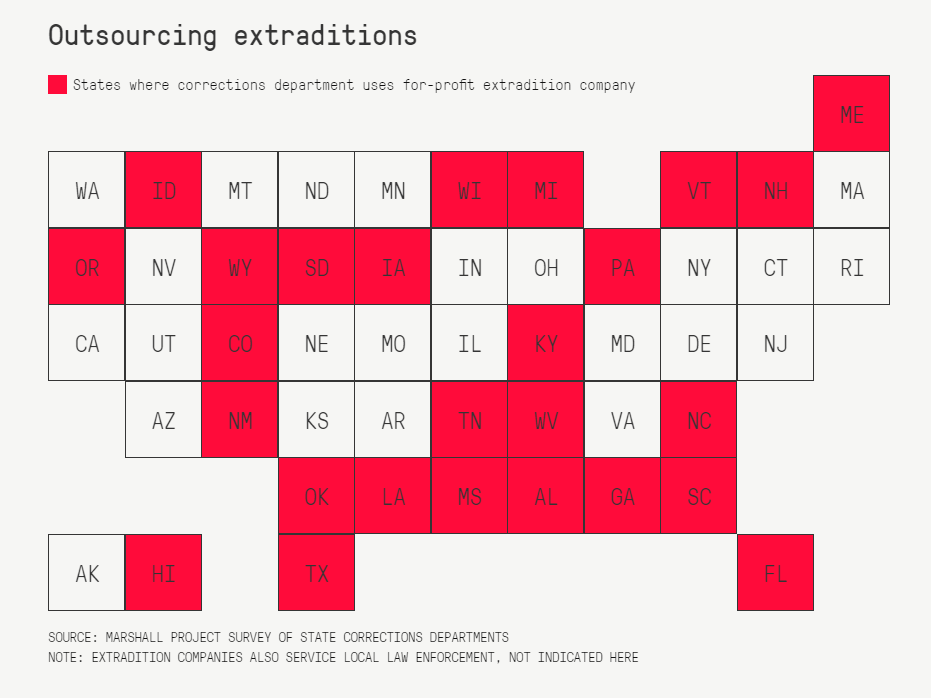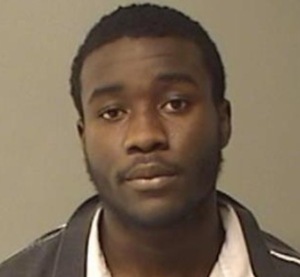
US Marshals loading prisoners for transport. From usmarshals.gov/what-we-do/prisoners/transportation
The odyssey of Urbana resident Shamar Betts continues. Betts was arrested for authoring a Facebook post at age 19 in the wake of the George Floyd murder in 2020. He was sentenced to four years in federal prison and charged with repaying nearly two million dollars for damage committed by many in C-U during this emotional time. His accounts of his prison experiences have been slightly edited for space. You can read more here, and find previous Public i articles on the Betts case here. Diesel therapy is slang for a form of punishment in which prisoners are shackled and transported for days or weeks.
I’m not sure what I expected jail to be like, but I know it wasn’t this. My first two months confined were some of the worst days of my life. I spent 21 days in Madison County, Mississippi, where I was placed alone in a unit designed for 14 inmates. The guard who booked me in put my picture on the door with a sign that read “Warning! Accompany inmate with 2 guards and 2 sets.”
He gave me two sheets (which had holes in them) and a mat that seemed thinner than a slice of cheese. The following day I was taken to an extradition hearing. I realized what “2 sets” meant when the guards started shackling my wrists and ankles just to walk me down the hall.
I remember returning to the unit, slowly limping from the soreness of metal being tightly clamped to my ankles, as two guards walked on either side of me exchanging strange looks. Finally, one spoke, “We ain’t never housed anyone that required all this shit. What’re you, some type of terrorist? Did you blow some’n up?”
For a second I was taken aback; then I replied, simply saying that I made a post on Facebook after George Floyd died and people started rioting. I will never forget how long I stood there, waiting for them to stop laughing.
The rest of my days consisted of the same routine. I took every opportunity to ask questions when the guards brought trays three times a day. I read in the law library for hours trying to make sense of what might happen to me. I’d cry myself to sleep most nights, others I would just lay in the dark talking to myself. It might sound crazy but what else do you do when you’re on lockdown 24/7 for three weeks straight?
Relief surged through me once the US Marshals came to retrieve me and told me I’d be returning to Illinois; instead I was thrown on and off planes for the next couple weeks. Each day I’d board a plane and fly across the country, landing in different states to drop other inmates off at their destinations. I’d always get off at the last stop of the day and spend a night or two in whatever jail was nearest the airport. I wasn’t allowed phone calls, commissary, or access to the general population—most of the time I didn’t even know what state I was in.

From the Marshall Project
Everything changed when I arrived in Grady County, Oklahoma, the nastiest jail I set foot in. As we got off the bus, my and the other inmates’ noses cringed in unison. Horseflies and roaches crowded the area. Plus, in the middle of a global pandemic no one was required to wear a mask. At the time I couldn’t care less, I was just grateful to be interacting with others.
Instead of a regular unit with separate cells, we were taken to an open room that had 36 triple bunk beds stacked around the perimeter. In the corner were two toilets labeled “pisser” and “shitter”. Directly next to the toilets were four showers, and in the center of the room six tables.
I noticed how quickly everyone became segregated. At one table sat Natives, others had Hispanics and whites. The rest of the tables were occupied by Blacks. We weren’t there three hours before an older Black man fell to the floor and began shaking uncontrollably while gasping for air. Several people pressed the emergency button but there wasn’t any response. A few others tried to help by pressing down on his chest and whispering encouraging words, but none of it changed the outcome. The shaking slowed and his hand rested on his chest. The ones who had crouched over him stood up, and we all crowded around watching him take his last breath.
Thirty seconds later nurses and guards rushed in, as if him dying was their cue to enter. The men were outraged. We demanded they tell us his cause of death, since we speculated it was COVID-19-related. They said he had had a seizure, but they gave us COVID tests just to be sure. 28 of the remaining 35 of us tested positive.
In the following days tension rose and suddenly everything hit the fan. You’d think it would be between inmates and correctional officers, but it was between the Natives and Blacks. I was sleeping when the commotion began and I woke up to the sounds of men screaming like 10-year-old girls and broomsticks snapping as they struck people’s backs. Blood covered the floor alongside bodies from both sides. I saw tough men weeping as their heads were kicked around by one person and their stomachs stabbed by the next.
Suddenly the crowd started to disperse as people ran in every direction to get away from the correctional officers forcing their way in with riot shields, mace, and 12-gauge shotguns that shot rubber bullets. I tried covering my face from the sting of the mace, but it did little to help. I wasn’t sure if tears fell down my face from my eyes burning or because I couldn’t believe what I had just witnessed.
II. Welcome to the Feds!
A reflection on Betts’s time at the Hazelton federal prison from November, 2021 to the present.
Federal prison is a completely different world from the county jails I’d been in for the previous year and a half. Segregation isn’t just by race, but also by region or state. We’re not allowed to converse, sit with, or share cells with anyone outside our race; and, if there’s tension between regions, we can’t even talk to someone from another state.
I’d seen my fair share of senseless violence since being incarcerated, but the Feds take it to another level. There have been instances where 100-plus people have gone to war over one person using a phone without permission. This once resulted in a two-month-long lockdown. The day we finally came out, it took only a few hours before the war started back up!
People die from suicide, rebelling against guards, lock-in-a-sock [a weapon consisting of a combination lock swung in a sock—eds.], drug overdose, and, most commonly—knives. These are not the shanks and sharpened toothbrushes you see on TV. These knives are made from the thick metal of the bunks and sharpened on concrete for days. I’ve seen inmates use knives as long as my forearm and sharp as a sword. I’ve heard the screams of someone being disciplined for stealing and the guards not discovering the body until the end of the night at count time.
Stories like these are constant. When I first reached the Feds I couldn’t make sense of this lifestyle and I used to be afraid I might not even make it out to tell these tales. Here I was, a person who’d worked with kids, now surrounded by some of the biggest drug dealers and killers in the country. I never expected to get used to this, but eventually I stopped informing my friends and family about these incidents because they became the normal, everyday situation for me in prison.
Betts’s 36 months of incarceration ended with his release from Hazelton on June 13, after he wrote this article; but he remains under Federal Bureau of Prisons parole responsibilities at a halfway house, and obligated to pay the aforementioned massive fine.

Shamar Betts is a graduate of Urbana High School who enjoys chess and reading. He is currently writing about his experiences after being arrested and sentenced to federal prison because of his Facebook post during the Black Lives Matter protests of 2020.
858 total views, 3 views today
